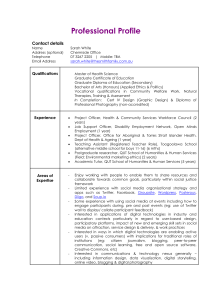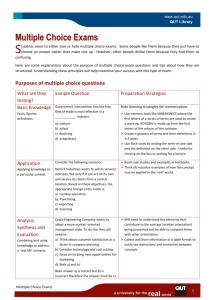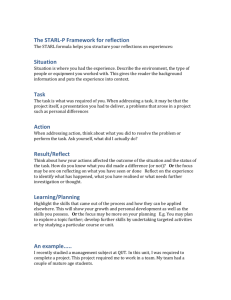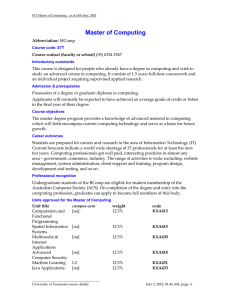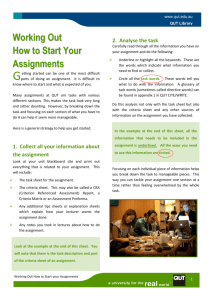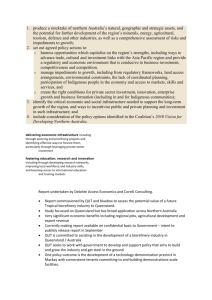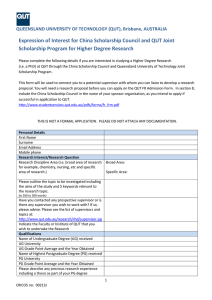Studying at Uni (PDF , 291KB) - Studywell
advertisement
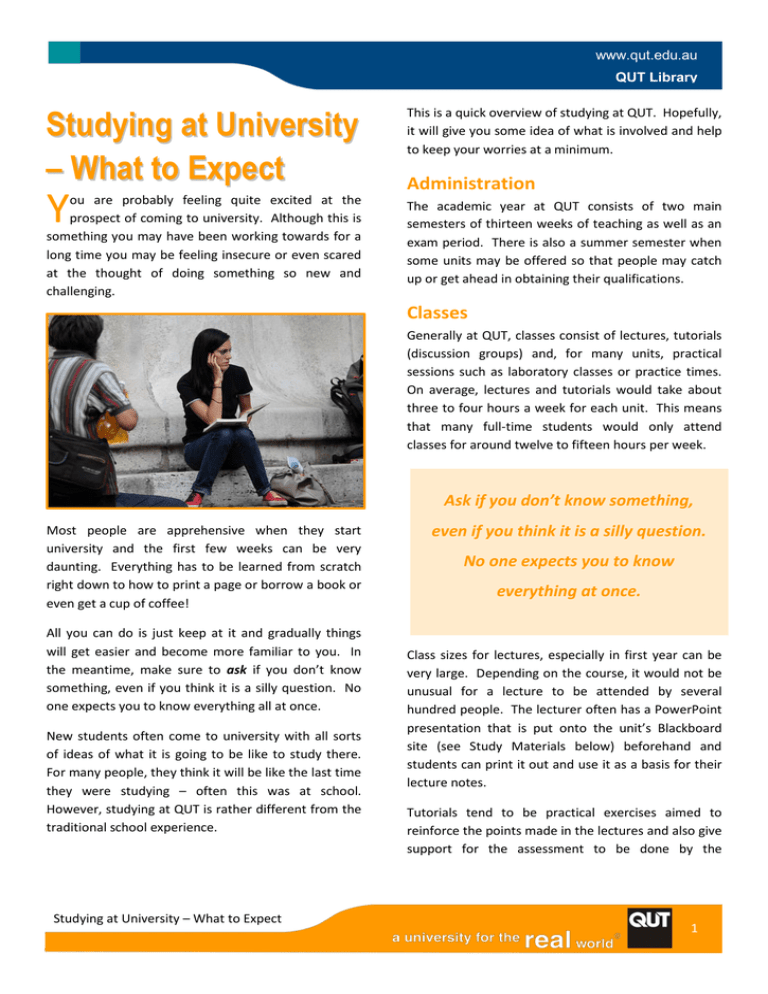
www.qut.edu.au QUT Library Studying at University – What to Expect Y ou are probably feeling quite excited at the prospect of coming to university. Although this is something you may have been working towards for a long time you may be feeling insecure or even scared at the thought of doing something so new and challenging. This is a quick overview of studying at QUT. Hopefully, it will give you some idea of what is involved and help to keep your worries at a minimum. Administration The academic year at QUT consists of two main semesters of thirteen weeks of teaching as well as an exam period. There is also a summer semester when some units may be offered so that people may catch up or get ahead in obtaining their qualifications. Classes Generally at QUT, classes consist of lectures, tutorials (discussion groups) and, for many units, practical sessions such as laboratory classes or practice times. On average, lectures and tutorials would take about three to four hours a week for each unit. This means that many full-time students would only attend classes for around twelve to fifteen hours per week. Ask if you don’t know something, Most people are apprehensive when they start university and the first few weeks can be very daunting. Everything has to be learned from scratch right down to how to print a page or borrow a book or even get a cup of coffee! All you can do is just keep at it and gradually things will get easier and become more familiar to you. In the meantime, make sure to ask if you don’t know something, even if you think it is a silly question. No one expects you to know everything all at once. New students often come to university with all sorts of ideas of what it is going to be like to study there. For many people, they think it will be like the last time they were studying – often this was at school. However, studying at QUT is rather different from the traditional school experience. Studying at University – What to Expect even if you think it is a silly question. No one expects you to know everything at once. Class sizes for lectures, especially in first year can be very large. Depending on the course, it would not be unusual for a lecture to be attended by several hundred people. The lecturer often has a PowerPoint presentation that is put onto the unit’s Blackboard site (see Study Materials below) beforehand and students can print it out and use it as a basis for their lecture notes. Tutorials tend to be practical exercises aimed to reinforce the points made in the lectures and also give support for the assessment to be done by the 1 www.qut.edu.au QUT Library students. Class sizes for tutorials are generally much small than for the lecture. Academics (Lecturers and Tutors) You may find that the person who gives the lectures is not the same as the person who takes your tutorials. Lecturers usually prepare the content and assessment for a unit and present it at lectures but they may have a whole team of people who take the tutorials. It is usually the tutors who mark the assignments of the people in their tutorial groups. If you find you have difficulty with a unit, your first point of contact should be your tutor. diverse. We have a student population of around about 40,000 students, mostly at the Gardens Point and Kelvin Grove campuses. While many first year students come straight from school, there is a It is not unusual to be in a tutorial group with people 10 or 20 years older or younger than you considerable number of students who return to study after spending some years working and /or travelling. It is not unusual to find yourself in a tutorial group with people who are 10 or 20 years older or younger than you. QUT has students from countries all over the world. Many academics (lecturers and tutors) may work part time or have duties other than teaching. It is often difficult to contact them if you have questions. Some academics have specific times when they will meet with students and other academic prefer if you email them. Find out the names, phone numbers and email addresses of your lecturers and tutors at the beginning of semester and check the way each academic prefers to be contacted. This is useful if you have an urgent question about your assessment at a later stage. Students Unlike school, where other students were generally the same age and often from a similar background, the student population at QUT is very large and Studying at University – What to Expect Likewise, there is a growing number of students who are coming to study at QUT from overseas. Many of these are from Asia and Eastern Mediterranean countries but there are also students from Africa, Europe and North America. Studying at QUT means you can get to know people of many different cultures with different customs and beliefs. Study Materials Blackboard Usually, all the information you need for each unit will be on the ‘Blackboard’ site. Blackboard is a large 2 www.qut.edu.au QUT Library website where each unit has its own page. You can find Blackboard in the Quicklinks bar on the QUT home page and the QUT Library home page. You can also access study information on Blackboard for each unit in which you are enrolled by clicking on the links on your QUT Virtual page. may only be used in the library for a period of 2 hours. This enables all students in a unit to have access to these materials. The Library All the materials you will need for your study are available through the Library. In addition to print books, you will need to access electronic books, journal articles and websites as part of your research. All of these resources you can access through the library catalogue. You should invest some time going to library classes to learn how to research effectively. It will ultimately save you a lot of time. It is worth having a look at this site after you enrol and browsing around all the pages. This is an important site as it is the main way your lecturer will communicate information about your unit and assessment. You should check this site regularly throughout the semester. CMD Another important source of information is the Course Materials Database. On this database a lecturer is able to place readings that s/he considers to be important for studying a particular unit. Often the materials you need to read in preparation for each week’s tutorials can be found on this database. This can also be a starting place when looking for information for assignments. Access to the CMD can be found through a link on your QUT Virtual page or from the QUT Library website. Course Reserve Many lecturers (but not all) also may have books or DVDs that are useful for a unit put into a special area of QUT Library called Course Reserve. These books Studying at University – What to Expect The Book Shop Textbooks and other reference books for all units offered at QUT can be bought at the QUT Bookshop. There are branches of this bookshop on each campus. Assessment Most assessment tasks at QUT tend to be either written or oral assignments or exams although some units may also have a practical component in their assessment. Many assignments include completion of a task (eg. health care plan in nursing or a set of drawings in architecture) as well as researching the background to 3 www.qut.edu.au QUT Library the task using academic literature. You will be expected to research for information much more widely than just the textbook or the readings given to you by the lecturer. Blackboard and readings for your units are also online on the Course Materials Database. You search for Assignments are generally written in essay or report form or they are given as oral presentations to the tutorial group. They may be individual tasks or you may need to do them as part of a group of students. At QUT you will find you will Many units also have exams. These may be in multiple choice, short answer or essay form or a combination of these. Exams generally are based on the lectures and the readings you have done throughout the semester. All the information you need for assignments and exams will be given to you in the lectures and tutorials. Also, the Library runs classes on how to do assignments and exams throughout semester. You can also get assistance from the Help Desk in the Library. need to use a computer for just about everything information using the Library’s online catalogue and you will need to use computer programs such as Word and PowerPoint for writing or presenting assignments. Computers are available for you to use at QUT that have all the software you need to write your assignments and create presentations. You will also have access to the Internet through these computers. You will have to log into these computers using your username and password. You will find computer laboratories available on each campus and computers are also available in the Library. Students who bring their own laptops to QUT are able to log into the system by wireless access. The IT Help Desk can help you set up your computer for this. PHOTO REFERENCES Technology At QUT you will find you will need to use a computer for just about everything. You will need to be able to access your email as that is a common way for lecturers and tutors to contact students. All the resources for your units are on a website called Studying at University – What to Expect Grace Fell, 'Thinking...' In: http://www.flickr.com/ photos/kuriousoranj/392964271/, ed, 2007. Alan Morton-Smith, 'Lecture theatre audience', In: http://www.flickr.com/photos/mosmi/3709805804/, ed, 2009. Rob Friesel, 'multi-tasking', In: http://www.flickr.com/ photos/found_drama/2635866475/, ed, 2008, mum with laptop juggles baby and study. James Ballantine, 'Laptop desks in the computer science building', In: http://www.flickr.com/photos/ maebmij/123180774/, ed, 2006. 4
